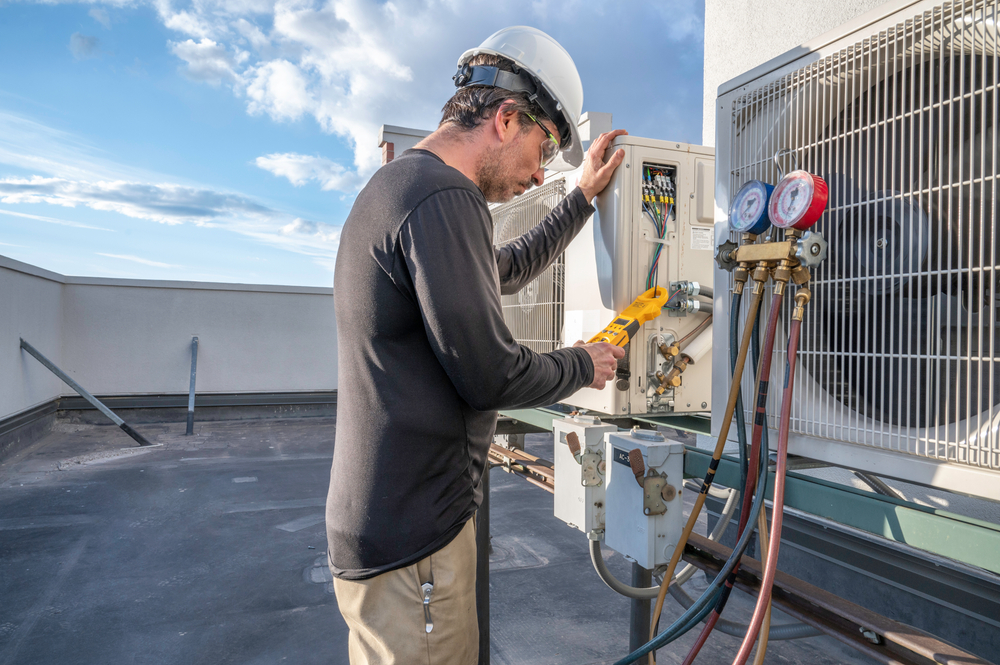How Often Should Commercial HVAC Be Serviced?

You probably don’t think about your business’s HVAC system every day. It’s easy to take it for granted—until it falters. To ensure your commercial HVAC system operates at its best, how often should it be serviced?
From energy efficiency to cost savings and environmental impact, we’ll share what goes into preventative care for commercial HVAC systems.
How Often Should Commercial HVAC Be Maintained?
A general guideline is to perform routine maintenance at least twice a year.
However, the frequency of maintenance for commercial HVAC systems can vary depending on factors such as the type of system, the size of the facility, the local climate, and the business’s specific needs.
Here is a suggested maintenance schedule.
Spring and Early Summer:
- Check and replace air filters.
- Inspect and clean evaporator and condenser coils.
- Inspect and clean drain pans and condensate lines.
- Check refrigerant levels.
- Inspect ductwork for leaks.
- Test thermostat operation.
Fall and Early Winter:
- Check and replace air filters.
- Inspect and lubricate fan motors and other moving parts.
- Inspect and clean burners (for heating systems).
- Check and tighten electrical connections.
- Test the heating system.
- Inspect the overall system for any signs of wear or damage.
Additionally, some components may require more frequent attention. For example, air filters may need to be checked and replaced more often, especially in environments with high dust or pollutant levels.
Another consideration is how hard your HVAC system works. Are there large, wide-open spaces that utilize exhaust fans? Do you need a clean room for precision work? Are there rooms that must be kept at precise temperatures? What about rooms that get too hot or too cold due to your industrial processes? You may need quarterly maintenance or checks for special conditions.
Related Post: How Facility Management Services Lower Your Energy Bill
These are general guidelines, and specific HVAC systems may have their own recommended maintenance schedules provided by the manufacturer. Regular maintenance helps ensure the efficient operation of the HVAC system, improves energy efficiency, prolongs equipment life, and reduces the risk of unexpected breakdowns at the most inconvenient times. Establishing a routine maintenance plan and working with a qualified team can help keep your system in optimal condition.
How Long Do Commercial HVAC Systems Last?
The lifespan of a commercial HVAC system can vary depending on the type of system, its usage, the quality of installation, and the level of maintenance it receives. Commercial HVAC systems can last anywhere from 15 to 25 years on average.
Here are some factors that can influence the lifespan of a commercial HVAC system.
Type of system: Different types of HVAC systems have different lifespans. For example, rooftop packaged units, which are common in commercial settings, typically have a lifespan of 15 to 20 years.
Maintenance: Regular and proper maintenance is crucial for extending the lifespan of an HVAC system. Routine inspections, cleaning, and timely repairs can prevent breakdowns and ensure the system operates efficiently.
Usage and load: The frequency and intensity of HVAC system usage impact its lifespan. Systems that constantly run or experience extreme temperature variations may wear out more quickly.
Installation quality: A properly installed HVAC system is likely to have a longer lifespan. Poor installation can lead to issues such as improper airflow, which can strain the system and reduce efficiency.
Technological advances: Advancements in HVAC technology may lead to more efficient and durable systems. Older systems may become outdated and less energy-efficient over time.
Environmental conditions: The climate conditions in which the HVAC system operates can affect its lifespan. For example, systems in coastal areas may be exposed to salt air, which can accelerate corrosion.
Manufacturer and model: The equipment’s quality and the manufacturer’s reputation can influence the system’s lifespan. High-quality systems from reputable manufacturers may have a longer operational life.
Businesses need to monitor the performance of their HVAC systems, conduct regular inspections, and follow a proactive maintenance plan to maximize the lifespan of the equipment. There are high-tech ways to do this with IoT devices and sensors that deliver data wirelessly to a facility management software suite.
Related Post: 6 Signs It’s Time to Replace Your Commercial HVAC System
When a system reaches the end of its lifespan or experiences frequent issues, replacing it with a newer, more efficient model may be more cost-effective. Regular consultations with HVAC professionals can help businesses decide when to repair or replace their commercial HVAC systems.
Is HVAC Preventative Maintenance worth it?
Yes, HVAC preventative maintenance is worth it. Regular maintenance provides several benefits that can save you money in the long run and ensure the optimal performance of your HVAC system.
Related Post: 4 Phases of Planned HVAC Maintenance Explained
Here are some key reasons why preventative maintenance is worthwhile.
- Energy efficiency: Regular maintenance ensures your HVAC system operates at peak efficiency. Clean coils, well-lubricated components, electrical switches and capacitors working well, and proper airflow all contribute to reduced energy consumption.
- Extended equipment lifespan: Routine maintenance helps identify and address potential issues before they become significant problems. This proactive approach can extend the lifespan of your HVAC equipment.
- Prevention of costly repairs: Small issues, if left unaddressed, can escalate into more extensive and more expensive problems. Preventative maintenance allows for the early detection and correction of issues.
- Improved indoor air quality: Regular cleaning and maintenance of HVAC components, such as filters and coils, improve indoor air quality. This is particularly important for commercial spaces where air quality can impact the health and productivity of occupants.
- Consistent comfort: A well-maintained HVAC system is better equipped to provide consistent heating or cooling throughout your facility. This is crucial for occupant comfort and can impact employee productivity and customer satisfaction.
- Compliance with warranty requirements: Many HVAC manufacturers require regular maintenance to maintain the warranty on their equipment. Skipping maintenance may void the warranty, leaving you responsible for repair or replacement costs.
- Reduced downtime: Scheduled maintenance allows for planned downtime when the system can be serviced without disrupting your business operations.
- Compliance with regulations: In some jurisdictions, some rules and standards require regular maintenance of HVAC systems to ensure energy efficiency and environmental compliance.
Contact Omnia360 Facility Solutions for HVAC Maintenance
While there is a cost associated with preventative maintenance, the long-term savings and benefits outweigh the initial investment. Omnia360 provides around-the-clock, comprehensive, preventative maintenance services that work with your in-house team. Contact us at (833) 360-6642.
How to Create an Energy-Efficient Building

Energy efficiency has emerged as a crucial step towards sustainable development.
Facility management companies can assist in transforming buildings into energy-efficient spaces that reduce operational costs and contribute to a greener future.
Omnia360 shares strategies that facility management companies can employ to update a commercial building’s energy efficiency and cut operational costs effectively.
Conduct Energy Audits
Conducting a thorough energy audit is essential before embarking on any energy efficiency improvement project. Energy audits assess a building’s current energy consumption and identify areas of improvement.
Related Post: How Facility Management Services Lower Your Energy Bill
Omnia360 offers collaborative project management projects, which can work to audit the building’s systems, insulation, lighting, HVAC, and other energy-intensive components. Insights gained from an audit can serve as a roadmap for prioritizing energy-saving initiatives.
Implement Energy-Efficient Lighting Solutions
Upgrading lighting systems is one of the easiest and most cost-effective ways to create energy efficiency.
Facility management companies can replace traditional incandescent bulbs with energy-efficient LED lights. LEDs consume significantly less energy and have a longer lifespan, reducing maintenance costs.
Additional steps like incorporating motion sensors and automated lighting controls ensure that lights are used only when necessary, further optimizing energy consumption.
Optimize HVAC Systems
HVAC systems are major energy consumers in buildings. To cut operational costs, the team at Omnia360 has experience in optimizing these systems.
Related Post: Commercial Air Conditioning FAQs
Regular maintenance, such as cleaning filters and ducts, can improve the HVAC system’s efficiency.
Upgrading to energy-efficient HVAC units, such as those with programmable thermostats and zoning capabilities, allows for better temperature control and reduced energy waste.
Insulate the Building
A well-insulated building is vital for maintaining a comfortable indoor environment and reducing energy costs.
Omnia360’s site-based solutions ensure you always have an experienced maintenance team when you need them. This includes knowledge of proper insulation materials for walls, roofs, and windows to prevent heat loss during winter and heat gain during summer.
Additionally, sealing any air leaks and drafts will further enhance the building’s energy efficiency, making a difference in utility bills.
Embrace Renewable Energy Sources
Integrating renewable energy sources is a game-changer in promoting energy efficiency. We can help your business explore options like solar panels, wind turbines, or geothermal systems to harness clean energy and reduce dependency on traditional power sources.
Though the initial investment may be higher, the long-term benefits in terms of energy savings make it worthwhile.
Educate and Involve Building Occupants
Creating energy efficiency goes beyond upgrades. It involves raising awareness and encouraging sustainable practices among employees.
Conduct workshops to educate employees about energy conservation tips and responsible resource usage. Engaging them in energy-saving initiatives, such as participating in energy challenges or rewards programs, helps promote sustainability in the building.
Monitor and Benchmark Energy Performance
Regularly monitoring energy consumption is crucial to assessing energy efficiency initiatives’ effectiveness.
Omnia360 can set energy performance benchmarks and track progress over time. Analyzing energy data allows us to identify areas that need improvement and make data-driven decisions to optimize the building’s energy efficiency further.
Start Saving on Energy Costs
Embracing energy efficiency in commercial buildings ultimately leads to reduced energy costs. Omnia360’s specialists in Cincinnati, Ohio, can provide a comprehensive maintenance plan to reduce your business’s energy consumption. Contact us today for more information: (833) 360-6642.
Project Management vs Facility Management: Why You Need Both

Facilities management is a broad discipline that encompasses a wide range of services, including project management, for an even wider variety of industry verticals, from manufacturing sites to corporate offices, e-commerce stores, and more.
Should you hire a project manager and a facilities manager, or team up with an FM company that offers both?
In today’s post, Omnia360fs, an integrated facility management company in Cincinnati, Ohio, explains why you should integrate project management as part of your facility management service package.
What’s Facility Maintenance?
Facility management involves the routine, strategic maintenance, and upkeep of a building to ensure it meets various standards: regulatory compliance, safety, energy efficiency, and functionality.
Core Benefits:
- Increased productivity
- Improved internal processes
- Improved labor efficiency
- A better-organized plan of operations
What’s Project Management?
According to the Project Management Institute, project management is defined as “the use of specific knowledge, skills, tools, and techniques to deliver something of value to people.”
Core Benefits:
- Clearer cost analysis
- Improved energy performance
- Asset tracking and upkeep
- Space or workstation optimization
What’s the difference between facilities management and project management?
Although the roles can overlap a bit, they’re fairly distinct. PM focuses on managing a project from beginning to end, whereas FM focuses on continuously managing and providing resources to ensure a building’s upkeep.
Key differences:
- PM is temporary, with a clear timeline from start to finish, but FM is ongoing and broader in its scope of activities and objectives.
- PM’s main objective is to finish a project on time and under budget; FM is there to support a pre-existing facility.
- PMs have more responsibilities; FM has fewer.
- PM has various methodologies; FM has inspection, maintenance, and space management.
3 Ways Integrating PM with FM Benefits Your Business
When you let your facility management company manage your projects, you’re hitting two birds with one stone and getting access to new insights and cost-saving potentials that just weren’t possible before.
1. Reallocating Your Budget.
It’s easy to find the best ways to flex your project’s dollars and maximize the effectiveness of your overall budget when a facility management team is overseeing project management duties.
Creating cost-saving initiatives is far easier when a single party understands the ins and outs of your facility’s needs and your project requirements.
2. Find Cost-Saving Insights.
By having your project manager and facility manager serve identical functions, cross-collaboration and new insights are available that would have otherwise fallen through the cracks, due to how siloed these two functions can be.
Where is money falling through the cracks on your project? Is it asset procurement, labor productivity, or some other factor that’s the cause?
Getting a two-pronged, strategic business approach to FM and PM gives you the exact insights you need to identify losses and correct them immediately.
Besides, if you’re running back and forth between your project manager and facility manager, there could be a game of telephone being had: missed information and missed opportunities. Hiring an FM company to oversee project management duties eliminates that risk.
What’s more, is that the understanding, budgeting, and optimization of a project’s workflow and internal processes can open the door to finding new opportunities for your facility to find cost-saving initiatives and improvements within certain areas.
3. Fully Integrated Systems Analysis
With FM and PM under one service provider, you’ll be able to get a bird’s eye view, along with a micro view, of your organization’s performance and how it ties into your project goals.
Leveraging the benefits of FM and PM software allows for accurate tracking and measurement of important metrics for your project’s KPIs. It can also streamline and integrate your overarching site management strategy, as it relates to your current project’s development.
When is Project Management the Right Fit?
Is your company in transition or understaffed? Is it a short-term project (within a few months)? Are you experiencing frequent or semi-frequent bottlenecks, struggling to delegate tasks, or collaborate with various stakeholders and interest groups?
If the answer is yes, a data-driven, collaborative PM/FM solution is perfect for you. If you’re unsure, our free assessment helps to identify whether or not project management services are necessary or if your budget is better spent elsewhere.
Omnia’s Project Management Services: What’s Included?
If your first thought is how great it would be to integrate project management services into your facility maintenance service contract, we’ll give you a good idea of what responsibilities are included as part of our PM services on small to medium-sized projects.
Cost Management.
Your budget matters. That’s why our PM services cover the entire gamut of cost management, from planning, budgeting, estimating, and control to cost applications like earned value analysis (EVA) — a way to measure the work performed on a project.
Project Risk Management.
Understanding risk and managing it is a major component of high-value project management services. Our project managers work to evaluate and categorize risk based on several variables specific to your project.
The types of risk management we account for include:
- Cost: The risk measurement of factors that could be a detriment to the budget, including cost estimation errors.
- Schedule: The risk of unaccounted-for scheduling conflicts that lead to delay, including scope creep, a common cause of timeline setbacks.
- Performance: The risk that certain events could impact performance or labor productivity is something that must be accurately measured and noted.
Forecasting Project Data.
We leverage the latest PM technologies to create predictive models of what — if any — bottlenecks, breakdowns, or potential drawbacks could occur during the course of a project. At Omnia360, we’re able to predict future performance based on streamlined data collection methods. Planning ahead means accessing more cost-saving opportunities.
Accurate Close Out Packages.
At the final stages of a project’s life cycle, our team is able to collect documentation deliverables and assemble them into a package that showcases the trajectory of the project. We believe in transparency, and providing insights into the data behind each decision before, during, and after a project’s completion.
Contact Omnia360 for Project Management Help Today
If you’re looking for help with your next small to medium-sized project, hiring an experienced facility management company is highly recommended.
Contact us for a free assessment of your building and/or your next organizational project.
Omnia360 Discusses The Power of Collaboration In Project Management

Reliable team members are the key to meeting deadlines. In the world of project management, projects can stall if proper communication isn’t maintained to keep the project moving forward.
We understand this and integrating project management to your business needs is a specialty of ours here at Omnia360 Facility Solutions. Our mobile and collaborative nature as a company is the reason we are so streamlined, successful, and focused in our pursuits of providing integrated project management to each of our clients. In today’s blog, we’ll explore the positive power of collaboration in project management.
What Is Collaboration?
Working in tandem with another person or a community to create something or execute a service is the universally accepted idea behind collaboration.
In the field of project management, this means communicating with multiple stakeholders, operations departments, and internal teams in order to meet the needs of the client and finish the project.
When Does My Business Need Project Management?
Project Management applies to any current or future project that will require a large amount of focused attention from multiple stakeholders.
This could include an office move, restructuring your HVAC system needs across all locations, updating your software as a company, navigating a company restructuring, and more. All of these common business situations would benefit from the use of effective project management.
Where Does Omnia360 Come Into Play?
Omnia360 Facility Solutions specializes in project management services, offered in our integrated, mobile, or on-site business solutions packages or as a standalone solution.
We have a team of industry experts, as well as a multitude of third-party contracted resources that we can bring to the table to expedite your project timeline. Our team is mobile and on-site, which speaks to the collaborative approach we offer within our organization.
Omnia360 Understands Your Project Management Needs
Omnia360 integrates facility management with efficient operations for project management. If you’re interested in receiving a collaborative solution, project management, mobile, or site-based solutions, we’d love to hear from you!
To learn more about our products and services, please get in touch with us online, or give us a call at 833.360.6642. We’re looking forward to hearing from you.